- Home
- Michael Swanwick
The Very Pulse of the Machine
The Very Pulse of the Machine Read online
The Very Pulse of the Machine
Michael Swanwick
Michael Swanwick
The Very Pulse of the Machine
This story first appeared in Asimov's Science Fiction, February 1998.
Nominated for Best Short Story.
Click.
The radio came on.
"Hell."
Martha kept her eyes forward, concentrated on walking. Jupiter to one shoulder, Daedalus's plume to the other. Nothing to it. Just trudge, drag, trudge, drag. Piece of cake.
"Oh."
She chinned the radio off.
Click.
"Hell. Oh. Kiv. El. Sen."
"Shut up, shut up, shut up!" Martha gave the rope an angry jerk, making the sledge carrying Burton's body jump and bounce on the sulfur hardpan. "You're dead, Burton, I've checked, there's a hole in your faceplate big enough to stick a fist through, and I really don't want to crack up. I'm in kind of a tight spot here and I can't afford it, okay? So be nice and just shut the fuck up."
"Not. Bur. Ton."
"Do it anyway."
She chinned the radio off again.
Jupiter loomed low on the western horizon, big and bright and beautiful and, after two weeks on Io, easy to ignore. To her left, Daedalus was spewing sulfur and sulfur dioxide in a fan two hundred kilometers high. The plume caught the chill light from an unseen sun and her visor rendered it a pale and lovely blue. Most spectacular view in the universe, and she was in no mood to enjoy it.
Click.
Before the voice could speak again, Martha said, "I am not going crazy, you're just the voice of my subconscious, I don't have the time to waste trying to figure out what unresolved psychological conflicts gave rise to all this, and I am not going to listen to anything you have to say."
Silence.
The moonrover had flipped over at least five times before crashing sideways against a boulder the size of the Sydney Opera House. Martha Kivelsen, timid groundling that she was, was strapped into her seat so tightly that when the universe stopped tumbling, she'd had a hard time unlatching the restraints. Juliet Burton, tall and athletic, so sure of her own luck and agility that she hadn't bothered, had been thrown into a strut.
The vent-blizzard of sulfur dioxide snow was blinding, though. It was only when Martha had finally crawled out from under its raging whiteness that she was able to look at the suited body she'd dragged free of the wreckage.
She immediately turned away.
Whatever knob or flange had punched the hole in Burton's helmet had been equally ruthless with her head.
Where a fraction of the vent-blizzard–"lateral plumes" the planetary geologists called them–had been deflected by the boulder, a bank of sulfur dioxide snow had built up. Automatically, without thinking, Martha scooped up double-handfuls and packed them into the helmet. Really, it was a nonsensical thing to do; in a vacuum, the body wasn't about to rot. On the other hand, it hid that face.
Then Martha did some serious thinking.
For all the fury of the blizzard, there was no turbulence. Because there was no atmosphere to have turbulence in. The sulfur dioxide gushed out straight from the sudden crack that had opened in the rock, falling to the surface miles away in strict obedience to the laws of ballistics. Most of what struck the boulder they'd crashed against would simply stick to it, and the rest would be bounced down to the ground at its feet. So that–this was how she'd gotten out in the first place–it was possible to crawl under the near-horizontal spray and back to the ruins of the moonrover. If she went slowly, the helmet light and her sense of feel ought to be sufficient for a little judicious salvage.
Martha got down on her hands and knees. And as she did, just as quickly as the blizzard had begun–it stopped.
She stood, feeling strangely foolish.
Still, she couldn't rely on the blizzard staying quiescent. Better hurry, she admonished herself. It might be an intermittent.
Quickly, almost fearfully, picking through the rich litter of wreckage, Martha discovered that the mother tank they used to replenish their airpacks had ruptured.
Terrific. That left her own pack, which was one-third empty, two fully charged backup packs, and Burton's, also one-third empty. It was a ghoulish thing to strip Burton's suit of her airpack, but it had to be done. Sorry, Julie. That gave her enough oxygen to last, let's see, almost forty hours.
Then she took a curved section of what had been the moonrover's hull and a coil of nylon rope, and with two pieces of scrap for makeshift hammer and punch, fashioned a sledge for Burton's body.
She'd be damned if she was going to leave it behind.
Click.
"This is. Better."
"Says you."
Ahead of her stretched the hard, cold sulfur plain. Smooth as glass. Brittle as frozen toffee. Cold as hell. She called up a visor-map and checked her progress.
Only forty-five miles of mixed terrain to cross and she'd reach the lander. Then she'd be home free. No sweat, she thought. Io was in tidal lock with Jupiter. So the Father of Planets would stay glued to one fixed spot in the sky. That was as good as a navigation beacon. Just keep Jupiter to your right shoulder, and Daedalus to your left. You'll come out fine.
"Sulfur is. Triboelectric."
"Don't hold it in. What are you really trying to say?"
"And now I see. With eye serene. The very. Pulse. Of the machine." A pause.
"Wordsworth."
Which, except for the halting delivery, was so much like Burton, with her classical education and love of classical poets like Spenser and Ginsberg and Plath, that for a second Martha was taken aback. Burton was a terrible poetry bore, but her enthusiasm had been genuine, and now Martha was sorry for every time she'd met those quotations with rolled eyes or a flip remark. But there'd be time enough for grieving later. Right now she had to concentrate on the task at hand.
The colors of the plain were dim and brownish. With a few quick chin-taps, she cranked up their intensity. Her vision filled with yellows, oranges, reds–intense wax crayon colors. Martha decided she liked them best that way.
For all its Crayola vividness, this was the most desolate landscape in the universe.
She was on her own here, small and weak in a harsh and unforgiving world.
Burton was dead. There was nobody else on all of Io. Nobody to rely on but herself. Nobody to blame if she fucked up. Out of nowhere, she was filled with an elation as cold and bleak as the distant mountains. It was shameful how happy she felt.
After a minute, she said, "Know any songs?"
Oh the bear went over the mountain. The bear went over the mountain. The bear went over the mountain. To see what he could see.
"Wake. Up. Wake. Up."
To see what he could–
"Wake. Up. Wake. Up. Wake."
"Hah? What?"
"Crystal sulfur is orthorhombic."
She was in a field of sulfur flowers. They stretched as far as the eye could see, crystalline formations the size of her hand. Like the poppies of Flanders field. Or the ones in The Wizard of Oz. Behind her was a trail of broken flowers, some crushed by her feet or under the weight of the sledge, others simply exploded by exposure to her suit's waste heat. It was far from being a straight path. She had been walking on autopilot, and stumbled and turned and wandered upon striking the crystals.
Martha remembered how excited she and Burton had been when they first saw the fields of crystals. They had piled out of the moonrover with laughter and bounding leaps, and Burton had seized her by the waist and waltzed her around in a dance of jubilation. This was the big one, they'd thought, their chance at the history books. And even when they'd radioed Hols back in the orbiter and wer
e somewhat condescendingly informed that there was no chance of this being a new life-form, but only sulfide formations such as could be found in any mineralogy text ... even that had not killed their joy. It was still their first big discovery.
They'd looked forward to many more.
Now, though, all she could think of was the fact that such crystal fields occurred in regions associated with sulfur geysers, lateral plumes, and volcanic hot spots.
Something funny was happening to the far edge of the field, though. She cranked up her helmet to extreme magnification and watched as the trail slowly erased itself. New flowers were rising up in place of those she had smashed, small but perfect and whole. And growing. She could not imagine by what process this could be happening. Electrodeposition? Molecular sulfur being drawn up from the soil in some kind of pseudocapillary action? Were the flowers somehow plucking sulfur ions from Io's almost nonexistent atmosphere?
Yesterday, the questions would have excited her. Now, her capacity for wonder was nonexistent. Moreover, her instruments were back in the moonrover. Save for the suit's limited electronics, she had nothing to take measurements with. She had only herself, the sledge, the spare airpacks, and the corpse.
"Damn, damn, damn," she muttered. On the one hand, this was a dangerous place to stay in. On the other, she'd been awake almost twenty hours now and she was dead on her feet. Exhausted. So very, very tired.
"O sleep! It is a gentle thing. Beloved from pole to pole. Coleridge."
Which, God knows, was tempting. But the numbers were clear: no sleep. With several deft chin-taps, Martha overrode her suit's safeties and accessed its medical kit. At her command, it sent a hit of methamphetamine rushing down the drug/vitamin catheter.
There was a sudden explosion of clarity in her skull and her heart began pounding like a jackhammer. Yeah. That did it. She was full of energy now. Deep breath.
Long stride. Let's go.
No rest for the wicked. She had things to do. She left the flowers rapidly behind.
Good-bye, Oz.
Fade out. Fade in. Hours had glided by. She was walking through a shadowy sculpture garden. Volcanic pillars (these were their second great discovery; they had no exact parallel on Earth) were scattered across the pyroclastic plain like so many isolated Lipschitz statues. They were all rounded and heaped, very much in the style of rapidly cooled magma. Martha remembered that Burton was dead, and cried quietly to herself for a few minutes.
Weeping, she passed through the eerie stone forms. The speed made them shift and move in her vision. As if they were dancing. They looked like women to her, tragic figures out of The Bacchae or, no, wait, The Trojan Women was the play she was thinking of. Desolate. Filled with anguish. Lonely as Lot's wife.
There was a light scattering of sulfur dioxide snow on the ground here. It sublimed at the touch of her boots, turning to white mist and scattering wildly, the steam disappearing with each stride and then being renewed with the next footfall. Which only made the experience all that much creepier.
Click.
"Io has a metallic core predominantly of iron and iron sulfide, overlain by a mantle of partially molten rock and crust."
"Are you still here?"
"Am trying. To communicate."
"Shut up."
She topped the ridge. The plains ahead were smooth and undulating. They reminded her of the Moon, in the transitional region between Mare Serenitatis and the foothills of the Caucasus Mountains, where she had undergone her surface training. Only without the impact craters. No impact craters on Io. Least cratered solid body in the solar system. All that volcanic activity deposited a new surface one meter thick every millennium or so. The whole damned moon was being constantly repaved.
Her mind was rambling. She checked her gauges, and muttered, "Let's get this show on the road."
There was no reply.
Dawn would come–when? Let's work this out. Io's "year," the time it took to revolve about Jupiter, was roughly forty-two hours fifteen minutes. She'd been walking seven hours. During which Io would've moved roughly sixty degrees through its orbit. So it would be dawn soon. That would make Daedalus's plume less obvious, but with her helmet graphics that wouldn't be a worry. Martha swiveled her neck, making sure that Daedalus and Jupiter were where they ought to be, and kept on walking.
Trudge, trudge, trudge. Try not to throw the map up on the visor every five minutes. Hold off as long as you can, just one more hour, okay, that's good, and another two miles. Not too shabby.
The sun was getting high. It would be noon in another hour and a half. Which meant–well, it really didn't mean much of anything.
Rock up ahead. Probably a silicate. It was a solitary six meters high brought here by who knew what forces and waiting who knew how many thousands of years just for her to come along and need a place to rest. She found a flat spot where she could lean against it, and, breathing heavily, sat down to rest. And think. And check the airpack. Four hours until she had to change it again. Bringing her down to two airpacks. She had slightly under twenty-four hours now. Thirty-five miles to go. That was less than two miles an hour. A snap. Might run a little tight on oxygen there toward the end, though. She'd have to take care she didn't fall asleep.
Oh, how her body ached.
It ached almost as much as it had in the '48 Olympics, when she'd taken the bronze in the women's marathon. Or that time in the internationals in Kenya when she'd come up from behind to tie for second. Story of her life. Always in third place, fighting for second. Always flight crew and sometimes, maybe, landing crew, but never the commander. Never class president. Never king of the hill. Just once–once!–she wanted to be Neil Armstrong.
Click.
"The marble index of a mind forever. Voyaging through strange seas of thought, alone. Wordsworth."
"What?"
"Jupiter's magnetosphere is the largest thing in the solar system. If the human eye could see it, it would appear two and a half times wider in the sky than the sun does."
"I knew that," she said, irrationally annoyed.
"Quotation is. Easy. Speech is. Not."
"Don't speak, then."
"Trying. To communicate!"
She shrugged. "So go ahead–communicate."
Silence. Then, "What does. This. Sound like?"
"What does what sound like?"
"Io is a sulfur-rich, iron-cored moon in a circular orbit around Jupiter. What does this. Sound like? Tidal forces from Jupiter and Ganymede pull and squeeze Io sufficiently to melt Tartarus, its sub-surface sulfur ocean. Tartarus vents its excess energy with sulfur and sulfur dioxide volcanoes. What does. This sound like? Io's metallic core generates a magnetic field that punches a hole in Jupiter's magnetosphere, and also creates a high-energy ion flux tube connecting its own poles with the north and south poles of Jupiter. What. Does this sound like? Io sweeps up and absorbs all the electrons in the million-volt range. Its volcanoes pump out sulfur dioxide; its magnetic field breaks down a percentage of that into sulfur and oxygen ions; and these ions are pumped into the hole punched in the magnetosphere, creating a rotating field commonly called the Io torus. What does this sound like? Torus. Flux tube. Magnetosphere. Volcanoes. Sulfur ions. Molten ocean. Tidal heating. Circular orbit. What does this sound like?"
Against her will, Martha had found herself first listening, then intrigued, and finally involved. It was like a riddle or a word-puzzle. There was a right answer to the question. Burton or Hols would have gotten it immediately. Martha had to think it through.
There was the faint hum of the radio's carrier beam. A patient, waiting noise.
At last, she cautiously said, "It sounds like a machine."
"Yes. Yes. Yes. Machine. Yes. Am machine. Am machine. Am machine. Yes.
Yes. Machine. Yes."
"Wait. You're saying that Io is a machine? That you're a machine? That you're Io?"
"Sulfur is triboelectric. Sledge picks up charges. Burton's brain is intact.
La
nguage is data. Radio is medium. Am machine."
"I don't believe you."
Trudge, drag, trudge, drag. The world doesn't stop for strangeness. Just because she'd gone loopy enough to think that Io was alive and a machine and talking to her, didn't mean that Martha could stop walking. She had promises to keep, and miles to go before she slept. And speaking of sleep, it was time for another fast refresher–just a quarter-hit–of speed.
Wow. Let's go!
As she walked, she continued to carry on a dialogue with her hallucination or delusion or whatever it was. It was too boring otherwise.
Boring, and a tiny bit terrifying.
So she asked, "If you're a machine, then what is your function? Why were you made?"
"To know you. To love you. And to serve you."
Martha blinked. Then, remembering Burton's long reminiscences on her Catholic girlhood, she laughed. That was a paraphrase of the answer to the first question in the old Baltimore Catechism: Why did God make man? "If I keep on listening to you, I'm going to come down with delusions of grandeur."
"You are. Creator. Of machine."
"Not me."
She walked on without saying anything for a time. Then, because the silence was beginning to get to her again, "When was it I supposedly created you?"
"So many a million of ages have gone. To the making of man. Alfred, Lord Tennyson."
"That wasn't me, then. I'm only twenty-seven. You're obviously thinking of somebody else."
"It was. Mobile. Intelligent. Organic. Life. You are. Mobile. Intelligent. Organic.
Life."
Something moved in the distance. Martha looked up, astounded. A horse. Pallid and ghostly white, it galloped soundlessly across the plains, tail and mane flying.
She squeezed her eyes tight and shook her head. When she opened her eyes again, the horse was gone. A hallucination. Like the voice of Burton/Io. She'd been thinking of ordering up another refresher of the meth, but now it seemed best to put it off as long as possible.
This was sad, though. Inflating Burton's memories until they were as large as Io.
Freud would have a few things to say about that. He'd say she was magnifying her friend to a godlike status in order to justify the fact that she'd never been able to compete one-on-one with Burton and win. He'd say she couldn't deal with the fact that some people were simply better at things than she was.

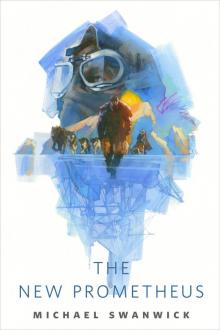 The New Prometheus
The New Prometheus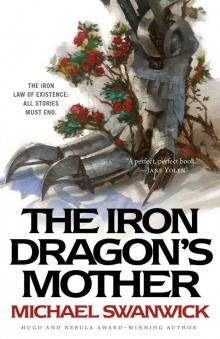 The Iron Dragon’s Mother
The Iron Dragon’s Mother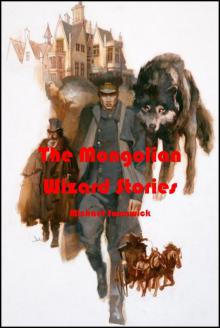 The Mongolian Wizard Stories
The Mongolian Wizard Stories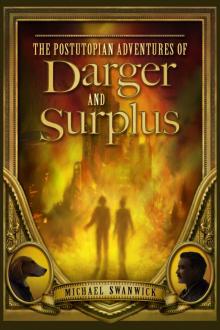 The Postutopian Adventures of Darger and Surplus
The Postutopian Adventures of Darger and Surplus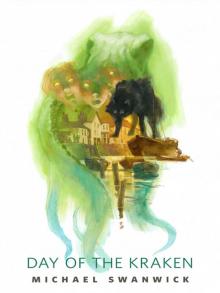 Day of the Kraken
Day of the Kraken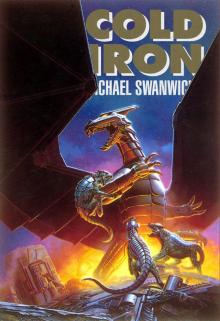 Cold Iron
Cold Iron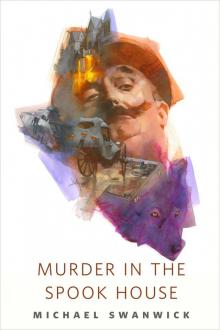 Murder in the Spook House: A Tor.com Original
Murder in the Spook House: A Tor.com Original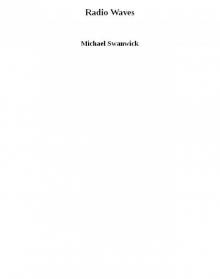 Radio Waves
Radio Waves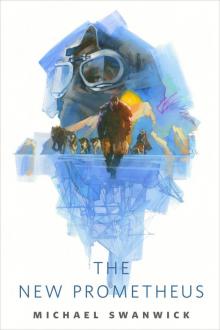 The New Prometheus: A Tor.com Original
The New Prometheus: A Tor.com Original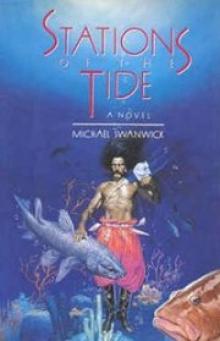 Stations of the Tide
Stations of the Tide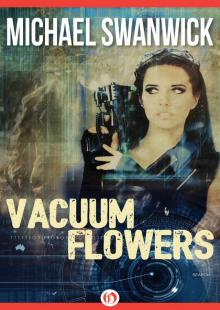 Vacuum Flowers
Vacuum Flowers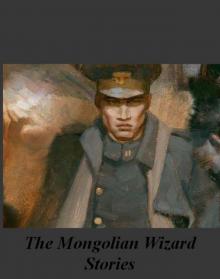 The Mongolian Wizard Stories (online stories 1-7)
The Mongolian Wizard Stories (online stories 1-7)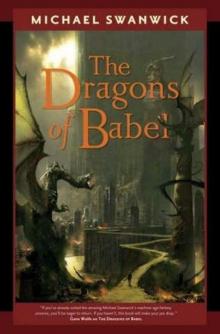 The Dragons of Babel
The Dragons of Babel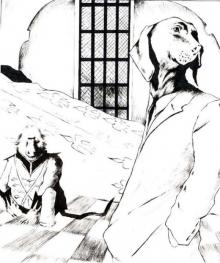 The Dog Said Bow-Wow
The Dog Said Bow-Wow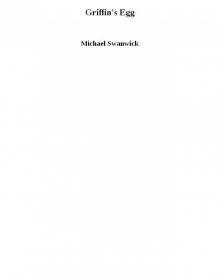 Griffin's Egg
Griffin's Egg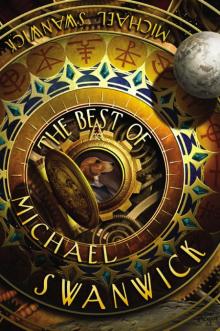 The Best of Michael Swanwick
The Best of Michael Swanwick Not So Much, Said the Cat
Not So Much, Said the Cat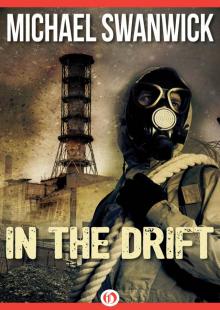 In the Drift
In the Drift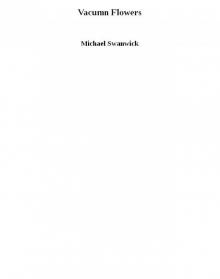 Vacumn Flowers
Vacumn Flowers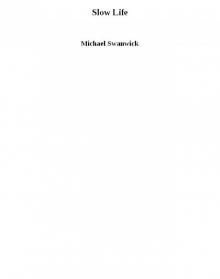 Slow Life
Slow Life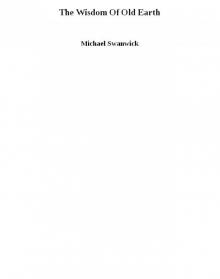 The Wisdom Of Old Earth
The Wisdom Of Old Earth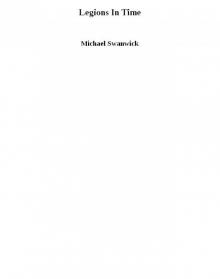 Legions In Time
Legions In Time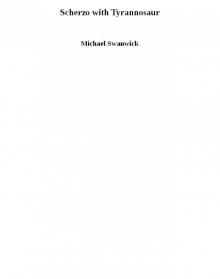 Scherzo with Tyrannosaur
Scherzo with Tyrannosaur The Year's Best Science Fiction (2008 Edition)
The Year's Best Science Fiction (2008 Edition)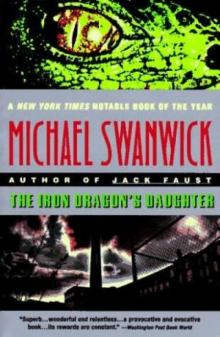 The Iron Dragon's Daughter
The Iron Dragon's Daughter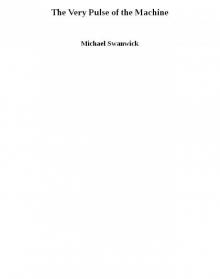 The Very Pulse of the Machine
The Very Pulse of the Machine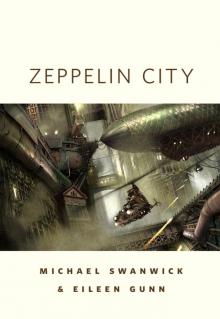 Zeppelin City
Zeppelin City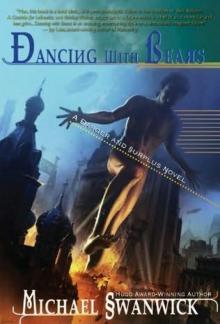 Dancing with Bears
Dancing with Bears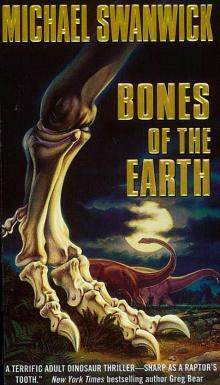 Bones of the Earth
Bones of the Earth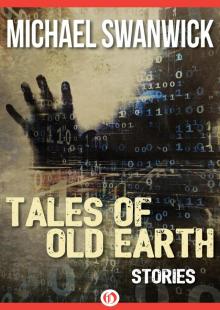 Tales of Old Earth
Tales of Old Earth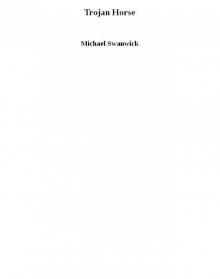 Trojan Horse
Trojan Horse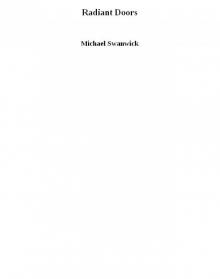 Radiant Doors
Radiant Doors